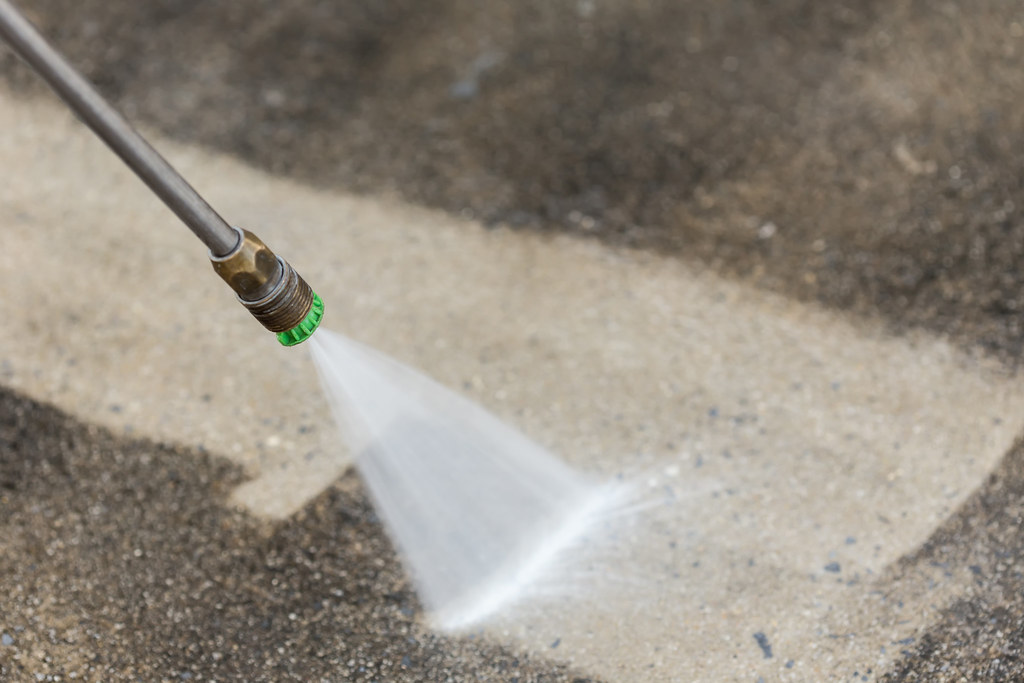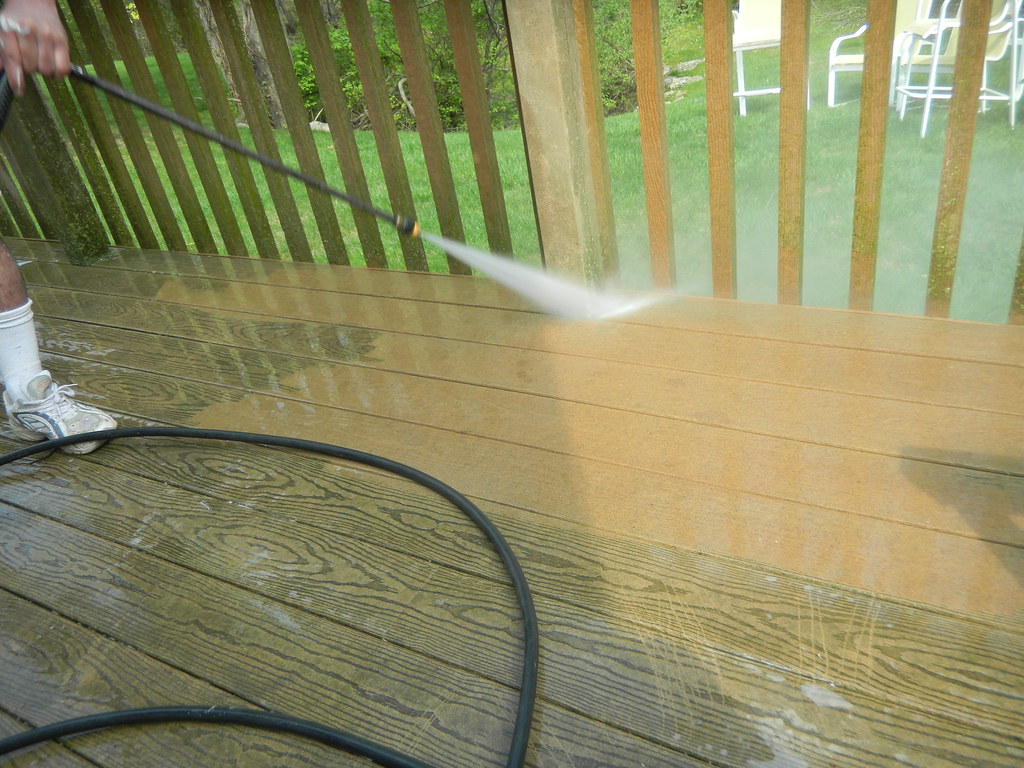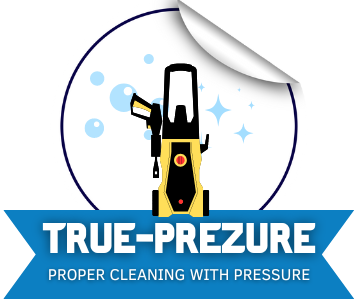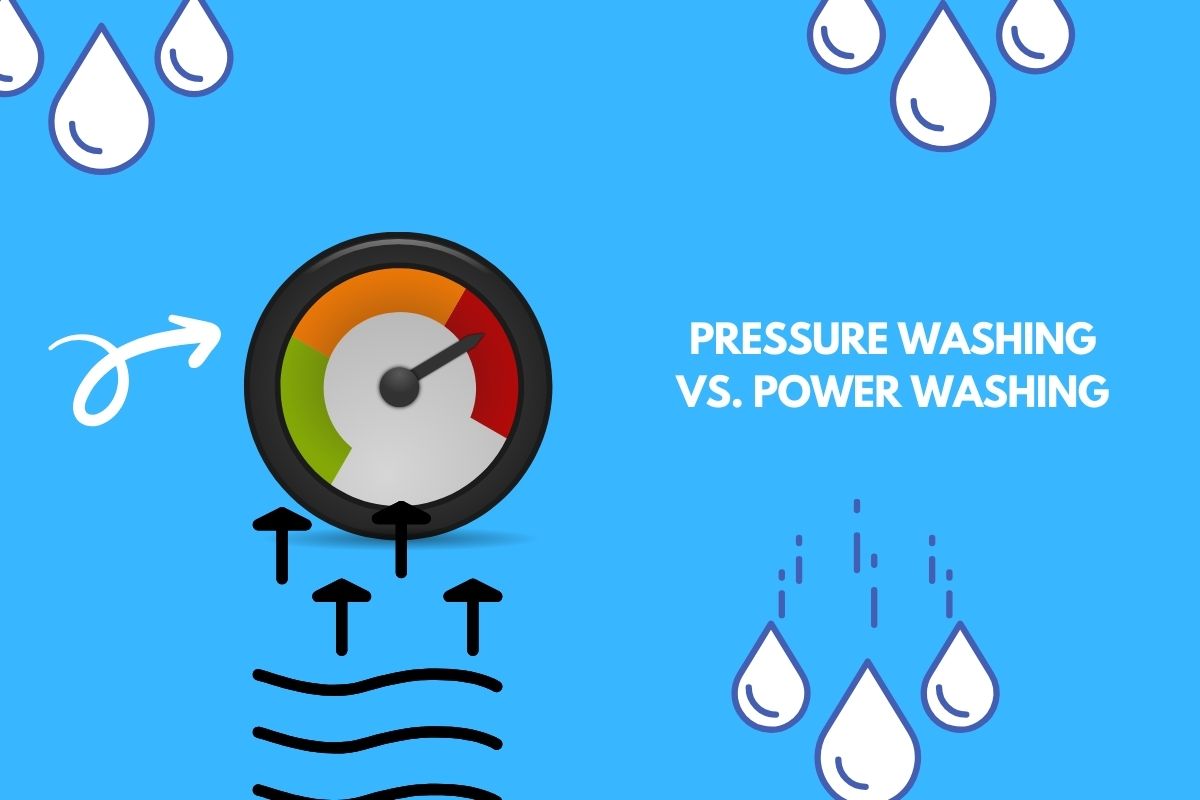Are you confused about the difference between power washing and pressure washing?
Don’t worry, you’re not alone! While both methods are used for cleaning outdoor surfaces, there are some key differences between them. Understanding what each method entails can help you make an informed decision when it comes to maintaining your home or building’s exterior.
In this blog post, we’ll break down the pros and cons of power washing and pressure washing, as well as provide expert advice on which one is right for your needs. So sit back, relax, and get ready to become a pro in all things outdoor cleaning!
Power Washing vs. Pressure Washing: The Differences
Power washing and pressure washing are two common methods for cleaning outdoor surfaces. While they may sound like the same thing, there are some key differences between them.
Firstly, power washing uses hot water at high pressure to remove dirt and grime from surfaces. This method is best suited for tough stains that require a bit of extra elbow grease to clean off.
On the other hand, pressure washing uses cold water at high pressure to blast away dirt and debris from surfaces. This method is great for regular maintenance cleaning on less stubborn stains.
Another difference between the two methods is their level of intensity. Power washing can be quite intense and can potentially damage delicate surfaces if not done correctly. Pressure washing, while still powerful, is generally gentler than power washing.
Ultimately, choosing between power washing vs pressure washing comes down to your specific needs and the condition of your outdoor surfaces. It’s always best to consult with a professional before deciding which method will work best for you.

What Pressure Washing Can Achieve for Your Building
Pressure washing is an effective way to clean your building’s exterior without causing damage. Using a high-pressure stream of water, pressure washing can remove dirt, grime, and other debris from surfaces such as concrete, brick or stone.
One of the benefits of pressure washing for your building is that it can increase its curb appeal. Over time, buildings accumulate dust and dirt which can make them look unappealing and even reduce their value. Pressure washing removes this build-up leaving behind a fresh and clean surface.
Another advantage of pressure washing is that it can protect your building from long-term damage caused by mold and mildew growth. These organisms thrive in damp environments and if left untreated they can cause significant damage to walls, roofs and foundations.
Pressure washing also prevents the need for costly repairs by removing harmful substances like bird droppings or tree sap before they have a chance to corrode or stain your building’s surfaces.
Pressure washing provides numerous benefits for maintaining the appearance and integrity of your commercial space while ensuring its long-lasting protection against damaging elements.
When To Choose Pressure Washing Vs Power Washing
When it comes to cleaning your home’s exterior, deciding whether to use pressure washing or power washing can be tricky. Both methods are effective in removing dirt and grime from surfaces, but each has its own strengths.
Pressure washing is the more gentle of the two methods as it uses less force than power washing. It’s a great option for cleaning delicate surfaces like stucco or brick without causing any damage. Pressure washers also tend to use less water which makes them ideal for areas experiencing drought conditions.
Power washing, on the other hand, uses hot water and high-pressure steam to blast away tough stains and grime. This method is more aggressive than pressure washing and can tackle stubborn grease stains on concrete driveways or patios with ease.
Ultimately, choosing between pressure washing vs power washing depends on what type of surface you’re cleaning and how dirty it is. If you have delicate surfaces that require a gentler touch, then opt for pressure washing. However, if you’re dealing with tough stains that won’t budge using traditional methods then go with powerwashing instead!

Work With The Experts At Waterproof Caulking & Restorations
At Waterproof Caulking & Restorations, we take pride in providing high-quality pressure washing and power washing services to our clients. Our team of experts is trained to handle all kinds of building exteriors, from residential homes to commercial buildings.
We understand that each building has unique cleaning needs, which is why we customize our services based on the requirements of your property. We use state-of-the-art equipment and eco-friendly solutions to ensure that your building looks its best without causing any harm to the environment.
Our professionals have years of experience in using both pressure washing and power washing techniques, allowing us to determine which method would work best for your specific situation. We are equipped with the knowledge and expertise required to provide exceptional service every time.
When you choose Waterproof Caulking & Restorations as your go-to experts for exterior cleaning, you can rest assured knowing that you’re working with a team dedicated to customer satisfaction. Contact us today for a free consultation!
What is Power Washing?
Power washing is a method of cleaning that uses high-pressure water to remove dirt, grime, and other debris from surfaces. It is typically used for larger areas such as driveways, sidewalks, and exterior walls.
The pressure of the water can be adjusted depending on the surface being cleaned. Power washing can be done using hot or cold water and sometimes with added detergent to aid in cleaning.
Power washing machines are typically gas-powered or electric and have different levels of PSI (pounds per square inch) which determine their power output. Higher PSI machines provide more pressure for tougher jobs like removing oil stains from concrete.
While power washing can be an effective way to clean many surfaces, it’s important to use caution when operating the equipment. If not used properly, high-pressure water jets can damage sensitive materials like wood or paint.
Power washing is a great option for tough outdoor cleaning jobs that require significant force to get rid of stubborn grime and dirt build-up.
How Does Power Washing Work?
Power washing is a cleaning method that uses high-pressure water spray to remove dirt, grime, mold, and other unwanted substances from surfaces. So how does power washing work exactly?
Firstly, a power washer machine pressurizes the water supply and then pumps it out through a specialized nozzle at very high pressure. The pressure can range from 1,200 PSI (pounds per square inch) to as much as 4,000 PSI depending on the job requirements.
The combination of high pressure and an adjustable nozzle creates a powerful stream of water that effectively blasts away dirt and debris from almost any surface. A skilled technician will adjust the flow rate according to the type of surface being cleaned so as not to damage delicate materials.
In addition to water alone, some power washers use chemical detergents or solvents for tougher cleaning jobs like removing graffiti or oil stains. These chemicals are mixed with water in the machine’s reservoir tank and dispensed through the same nozzle.
Power washing is an effective way to clean large exterior spaces quickly and efficiently without using harsh chemicals or damaging fragile surfaces when done by professionals who have been trained in safety procedures.
Power Washing Advantages and Disadvantages
Power washing has become a popular cleaning technique for removing stubborn dirt and grime from surfaces. One of the main advantages of power washing is that it can clean large areas quickly and efficiently with high-pressure water streams. This makes it suitable for cleaning exterior walls, decks, patios, driveways, and sidewalks.
Another advantage of power washing is its ability to remove tough stains like oil spills or graffiti. The high pressure helps to break down particles on the surface making them easier to wash away.
However, there are some disadvantages associated with power washing as well. The high pressure used in this method can sometimes damage delicate surfaces such as wood or vinyl siding if not handled properly by an experienced professional.
Additionally, power washing uses more water than other cleaning methods which can be wasteful in areas experiencing drought conditions or where water conservation is essential.
While there are benefits to using power washing for certain types of cleaning projects it’s important to weigh up these advantages against potential risks before deciding whether this method is right for your needs.
What is Pressure Washing?
Pressure washing is a popular cleaning method that uses high-pressure water to blast away dirt, grime, and other particles from surfaces. This type of cleaning can be used for a wide range of applications, including buildings, concrete driveways, sidewalks, decks and patios.
The process involves using a pressure washer machine with an adjustable nozzle that allows the user to adjust the water pressure according to the surface being cleaned. The higher the pressure level set on the machine; the more forceful it will hit against any debris or dirt on your property.
One of the advantages of using this method over power washing is that less water is needed during operation. Pressure washers use about 75% less water than garden hoses which makes them an eco-friendly option when it comes to exterior cleaning.
While there are many benefits associated with pressure washing such as removing mold and mildew from building exteriors; keep in mind that it’s not always safe for all surfaces. For example, softer surfaces like wood should be treated with caution since they can easily get damaged by high-pressure jets.
In summary, if you’re looking for a quick way to clean up exterior stains on hard surfaces without damaging them permanently- then pressure washing might just be what you need!
Pressure Washing Advantages and Disadvantages
Pressure washing is a popular way of cleaning hard surfaces using high-pressure water. It can be done with hot or cold water and is useful for removing dirt, grime, and other stains from various surfaces such as concrete, brick, or wood.
There are several advantages to pressure washing. Firstly, it’s an efficient way of cleaning large areas quickly. Secondly, it requires less water than traditional methods because the high-pressure stream cuts through dirt easily. Thirdly, pressure washing can remove tough stains that may not come off with regular scrubbing.
However, there are also some disadvantages to consider when using this method of cleaning. For example, if the pressure is too high or aimed at the wrong angle on certain materials like shingles or vinyl siding it could cause damage by stripping away paint or causing cracks in the surface. Additionally, overuse of pressure washing on specific surfaces could lead to weakening them over time.
It’s essential to take precautions before using a pressure washer and choosing the right nozzle attachment based on your needs and surface type will help avoid potential damages while achieving maximum results.
Power Washing vs Pressure Washing Summary
When it comes to cleaning the exterior of your building, you have two options: power washing and pressure washing. While they may seem interchangeable at first glance, there are some important differences between the two.
Power washing uses hot water and high-pressure jets to blast away dirt, grime, and other buildup on surfaces. It’s a great option for heavy-duty cleaning tasks like removing oil stains from driveways or cleaning large commercial buildings.
Pressure washing, on the other hand, uses cold water and high-pressure jets to clean surfaces. It’s a more gentle option that can be used for regular maintenance tasks like cleaning siding or decks.
It’s important to consider what type of surface you’re looking to clean when deciding between power washing vs pressure washing. Power washing is more effective on hard surfaces like concrete or brick while pressure washing is better suited for softer materials like wood or vinyl siding.
Ultimately, the decision between power washing vs pressure washing will depend on your specific needs and preferences. Consider factors such as cost, time constraints, and potential damage before choosing which method is right for you.
FAQ
DO PRESSURE WASHERS USE LESS WATER?
One of the most common questions about pressure washing and power washing is whether or not these methods use less water than traditional cleaning methods. The answer, in short, is yes – pressure washers do use less water to clean a given surface area than other methods.
The reason for this is simple: pressure washing uses high-pressure water jets to blast away dirt and grime from surfaces, rather than relying on harsh chemicals or manual scrubbing. Because the water is being used at such high pressures, it’s able to penetrate deep into porous materials like concrete or brickwork, dislodging built-up dirt and grime without needing as much volume of water.
That being said, it’s worth noting that there are some situations where using a pressure washer may actually consume more water than other methods. For example, if you’re trying to clean a very large surface area (like an entire building), then you may need to spend longer periods of time running your machine – which can ultimately lead to using more water overall.
Though, when used correctly by experienced professionals like those at Waterproof Caulking & Restorations – pressure washing can be an efficient way to get your property looking its best while also conserving valuable resources!
WHICH TYPE OF CLEANING IS BETTER FOR MY HOME?
When it comes to cleaning your home, you may be wondering which type of cleaning is better: pressure washing or power washing? The answer really depends on the specific needs of your home.
Pressure washing uses highly pressurized water to remove dirt and grime from surfaces. It’s great for removing tough stains on concrete driveways or walkways. Power washing, on the other hand, uses hot water in addition to high pressure. This can be more effective for removing grease or oil stains.
If you’re looking to clean exterior walls or siding, pressure washing may be a better option as it won’t damage the surface like power washing could. However, if you have a heavily stained deck or patio area with built-up dirt and grime, then power washing might be necessary.
Ultimately, the best choice will depend on what areas need cleaning and how dirty they are. It’s always best to consult with a professional who can assess your specific situation and recommend the best course of action.
WHY SHOULDN’T I DIY SOFT WASH OR PRESSURE WASH?
DIY projects have become increasingly popular in recent years, and it’s no surprise that many homeowners are considering tackling their own pressure washing or soft washing tasks. However, there are numerous reasons why this may not be the best idea.
Firstly, without proper training and experience, a homeowner can cause damage to their property when using high-pressure equipment. This could include chipping paint off of walls or stripping away siding materials.
In addition to potential property damage, there is also a risk of injury when operating power equipment. The force generated by these machines can easily cause bodily harm if mishandled.
Moreover, DIY cleaning solutions may not be effective at removing tough stains or grime buildup. Professionals use industrial-grade cleaners tailored for each specific job they handle.
Professional power washers understand how much pressure should be applied to different surfaces and know what techniques will achieve optimal results without causing any damage. In contrast, an inexperienced homeowner might end up with uneven surfaces after attempting pressure washing on their own.
While DIY projects can save money in some cases; however when it comes to home maintenance tasks like pressure washing or soft washes it is better left to professionals who have the knowledge and expertise required for efficient job execution!
Conclusion
After weighing the advantages and disadvantages of pressure washing and power washing, it’s clear that both methods have their own uses depending on the type of surface you need to clean. Pressure washing is ideal for lighter tasks such as cleaning outdoor furniture or removing dirt from your driveway. Power washing, on the other hand, is better suited for tougher jobs like preparing a surface before painting or cleaning large commercial buildings.
It’s important to work with experts who understand how these techniques can be used effectively and safely. The team at Waterproof Caulking & Restorations has years of experience in providing top-notch services using both power washing and pressure washing techniques.
If you’re still unsure about which method to choose for your cleaning project, our professionals will happily discuss your options with you. We’ll help determine what technique is best suited for your specific needs based on factors such as material types, level of grime buildup, and more.
At Waterproof Caulking & Restorations, we know that maintaining a clean exterior not only enhances curb appeal but also provides long-term protection against damage caused by harsh weather conditions or wear-and-tear over time. Contact us today to learn more about our services!

